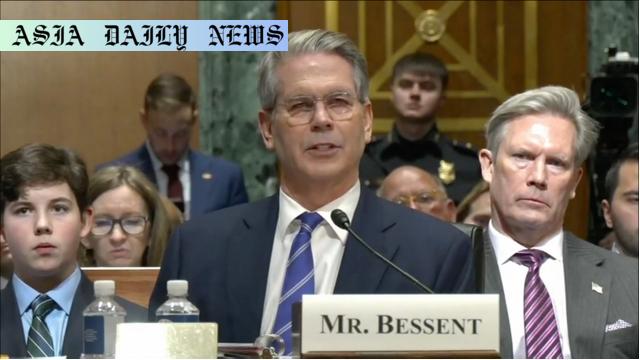Currency: Treasury Secretary Scott Bessent clarifies no specific currency targets exist in US-Japan trade talks to stabilize markets.
Currency concerns remain central to US-Japan trade negotiations.
Scott Bessent negates specific currency targets in these talks.
Speculation exists regarding Washington’s stance on yen strength.
Bessent reinforces adherence to G7 commitments on free markets.

Scott Bessent Reassures Market Stability Amid US-Japan Trade Talks
Treasury Secretary Scott Bessent recently addressed speculations regarding US-Japan trade negotiations, firmly stating that there are no specific currency targets in play. This clarification arrives amidst rumors suggesting that Washington was urging Tokyo to allow the yen to appreciate against the dollar. The comments follow concerns raised by US President Donald Trump highlighting Japan’s currency management in the context of trade imbalances. While speculation swirled in the media, Bessent underlined the US commitment to a free-market approach, referencing an agreement among G7 nations to let currency values be determined by market forces.
G7’s Role in Currency Policies: A Reminder from Bessent
A pivotal part of Bessent’s statement lies in the reinforcement of the G7 accord. The agreement stipulates that its member nations, including Japan, rely on markets to dictate currency valuations. Such an approach ensures that interventions remain limited unless significant disorder arises. Bessent expressed confidence in Japan’s adherence to this framework, reiterating the importance of trust and collaboration within G7 nations. However, the backdrop of comments from Trump has bred skepticism over whether external pressures would influence Japan’s monetary policies. Ensuring clarity and alignment among the global economies has pertinently remained a top priority for Bessent.
Currency Market Reactions and Implications on Trade
The dynamics between currency exchange rates and trade relations cannot be overlooked. On Tuesday, the yen fell against the dollar, briefly weakening to levels of 143 yen per dollar during Tokyo’s morning trading session. Such fluctuations have critical ramifications for import-export equations between the US and Japan. A weaker yen favors Japanese exports, giving them a price advantage, while simultaneously increasing the cost of American goods to Japanese consumers. Bessent’s clarification aims to mitigate such volatility by dispelling rumors that US-Japan talks would shift foreign exchange policies in a predetermined manner.
Meeting of Leaders to Shape Economic Pathways
As trade discussions between the two major economies continue, Kato Katsunobu, Japan’s Minister of Finance, is anticipated to meet with Bessent in Washington soon. Their discussions bear critical significance, particularly given Japan’s rising economic challenges and the United States’ long-standing concerns over trade deficits. While this meeting holds potential to bolster cooperation, it also highlights longstanding disputes where currency alignment is a sensitive issue. Open dialogues like these exemplify concerted efforts to strike an equitable balance that benefits all stakeholders in this global economic partnership.
In conclusion, Bessent’s latest remarks emphasize the US administration’s resolve for stable and transparent trade relations while respecting free-market principles. The currency debate, though rife with speculation, underscores the intricate dynamics that define today’s globally interconnected economies. As US-Japan relations continue to evolve, adherence to multilateral agreements and mutual respect will remain paramount for sustainable economic progress.



Commentary
The Impact of Currency Talks on Global Trade
Currency dynamics have long been a pivotal factor in global trade, and the recent US-Japan trade discussions underscore just how significant these dynamics remain. Treasury Secretary Scott Bessent’s remarks provide a sense of reassurance, reinforcing that the US has no specific currency targets in mind during the negotiations. His insistence on adhering to market-determined exchange rates as per the G7 agreement ensures that international collaborations are rooted in transparency and fairness, both crucial for sustained economic harmony.
The Broader Economic Implications
While the statements offer clarity, they also expose some underlying tensions in the global trade framework. President Trump’s persistent commentary on the weaker yen reflects frustration over the US trade deficit, but it also brings geopolitical considerations into the mix. The strength of a nation’s currency can directly influence its economic competitiveness, making this an undeniably sensitive topic. Japan, as one of the world’s largest economies, must carefully navigate these challenges to maintain its trade relations with the US. The shared commitment to free-market principles will be crucial as these two economic powerhouses engage in discussions.
Looking Ahead to Collaborative Solutions
As global economies become increasingly intertwined, trust and mutual agreements must form the bedrock of policy-making. The upcoming meeting between Kato Katsunobu and Scott Bessent provides an essential opportunity to continue a productive dialogue. Such discussions will not only shape the bilateral relationship between the US and Japan but also set an example for other nations grappling with similar economic challenges. While currency policies may appear as technical facets of trade, their implications resonate far beyond, affecting businesses, consumers, and international stability. Striking a harmonious balance will require effort, diplomacy, and mutual respect.